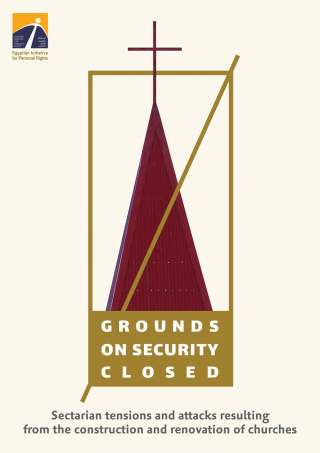The Egyptian Initiative for Personal Rights is deeply concerned about the judgment issued yesterday by the Atfih Misdemeanor Court in the Giza governorate in case no.
Files: Coptic Church
Introduction
On September 28, 2016, Law 80/2016 was adopted to regulate the construction and renovation of churches and their annexes. State officials, parliamentarians, and some sectors of the Christian ecclesiastical leadership heralded the new law as a solution to the long-standing difficulties of building or renovating churches.
The study includes an analytical section and two annexes. The analysis reviews statutes regulating church construction, significant court rulings of relevance, and their impact on the legal status of existing churches and various official licenses. The study then looks at the types and frequency of sectarian attacks linked with the exercise of the right of worship, offering a quantitative analysis of the 74 sectarian attacks seen in Egypt from January 25, 2011 to August 2016. It describes the flashpoints of tension, the profile of attacks and their relationship to political parties or governing forces, and whether patterns changed in tandem with changes in regime.
The study includes an analytical section and two annexes. The analysis reviews statutes regulating church construction, significant court rulings of relevance, and their impact on the legal status of existing churches and various official licenses. The study then looks at the types and frequency of sectarian attacks linked with the exercise of the right of worship, offering a quantitative analysis of the 74 sectarian attacks seen in Egypt from January 25, 2011 to August 2016.
The Egyptian Initiative for Personal Rights has criticized the authorities’ handling of the case of Coptic students who were forcibly displaced from al-Arish in North Sinai last February.
The Egyptian Initiative for Personal Rights expresses its deep concern about the House of Representatives’ rushed approval of the law regulating the construction and renovation of churches.
As part of efforts by the Egyptian Initiative for Personal Rights to promote freedom of religion and belief and associated rights—most significantly, to build and renovate churches and religious structures—it is launching a campaign titled “Closed on Security Grounds: for a Fair Law on Church Construction.”
“The government has failed to deal with the issue of Christian-Muslim relations and sectarian attacks due to the dominance of a purely security mentality,” said Ishak Ibrahim
In the most recent case (no. 350/2015), the Beni Mazar Juvenile Misdemeanor Court sentenced three Coptic students—Muler Atef Daoud, Albert Ashraf, and Bassem Amgad—to five years in prison.
“Whose Customs? The Role of Customary Reconciliation in Sectarian Disputes and State Responsibility”
the Egyptian Initiative for Personal Rights released a study on the use of customary reconciliation to resolve sectarian disputes and the state’s responsibility for the violation of citizenship rights and its support for discriminatory procedures against Coptic citizens.





